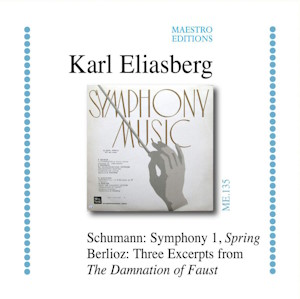
Robert Schumann (1810-1856)
Symphony No.1 in B flat, Op.38 ‘Spring’ (1841)
Hector Berlioz (1803-1869)
The Damnation of Faust (extracts): I. Hungarian March II. Dance of the Sylphs III. Dance of the Will-of-the-Wisps (1846)
Leningrad Radio Symphony Orchestra (Schumann), Leningrad Philharmonic Orchestra (Berlioz)/Karl Eliasberg
rec. c.1959 and first released on Melodiya D 06205-06
Maestro Editions ME135 [46]
Karl Eliasberg (1907-1978) is best-remembered for conducting (though not premiering) Shostakovich’s Leningrad Symphony in August 1942 in the beleaguered city’s Bolshoi Philharmonic Hall. The concert was, however, the work’s premiere in the city and was widely broadcast. Though he was so closely associated with the Leningrad, Mravinsky’s return to the Philharmonic after the War sealed Eliasberg’s fate and he only conducted there three times in the next three decades – each of them being the Seventh and none with the Leningrad Philharmonic.
He did make recordings, however, though probably not as many as his talent deserved. He was active as an accompanist to such as Grinberg, Oistrakh and Knushevitzky, and he was clearly something of a Brahmsian (recording the Third Symphony, the German Requiem and the Double in particular) as well as Taneyev, Bach’s Mass in B minor and Mahler’s Fourth. His Shostakovich Seventh Symphony recording was made on a rare return to Leningrad in 1964.
There are undoubtedly many more live survivors (Oistrakh’s Kabalevsky Concerto prominently), as well as studio recordings, as this example shows, though the nature of his surviving discography hardly suggests he was given a settled, broadly-based or systematic approach to recording. Schumann’s First Symphony and the Berlioz excerpts were recorded around 1959 and released the following year on Melodiya D 06205-06. The performance is naturally phrased and full of buoyant musicality, with Eliasberg directing the Leningrad Radio Symphony Orchestra, the city’s second orchestra. The Larghetto is sympathetically phrased and there are no gestures to draw the ear from the symphonic argument. The orchestra’s winds are very personable – especially in the Scherzo – though the strings are inclined to be sinewy-scrawny, which may or may not be a corollary of the recording microphones; I don’t happen to think it is. The finale is athletic and suitably vigorous.
The Berlioz extracts are with Mravinsky’s Leningrad Philharmonic and the gulf between the two orchestras is plain to hear. They blaze away in the Hungarian March and offer a characterful trio of performances.
The actual sound quality and frequency responses of the transfer are good but with the best will in the world transferring to CD an LP that is littered with ticks and chuffs is really not going to work. It might be bearable if this was a unique copy (even so there are ways to eliminate the imperfections or dampen them) but this is a commercial Melodiya. This applies to the Schumann and not so much to the Berlioz but given the symphony takes up the bulk of the 46 minutes’ playing time, I’m afraid this is a total non-starter.
Jonathan Woolf
Availability: Maestro Editions


















